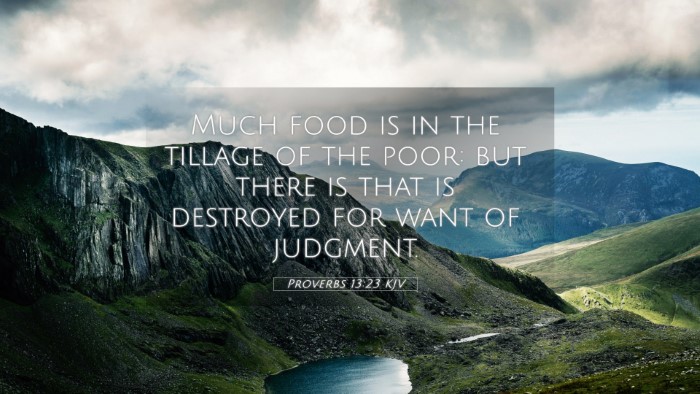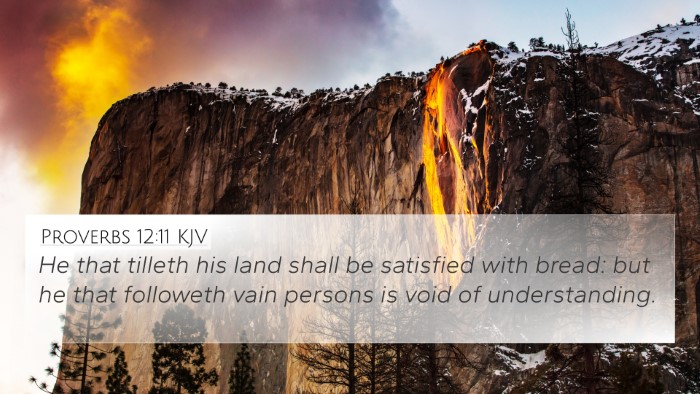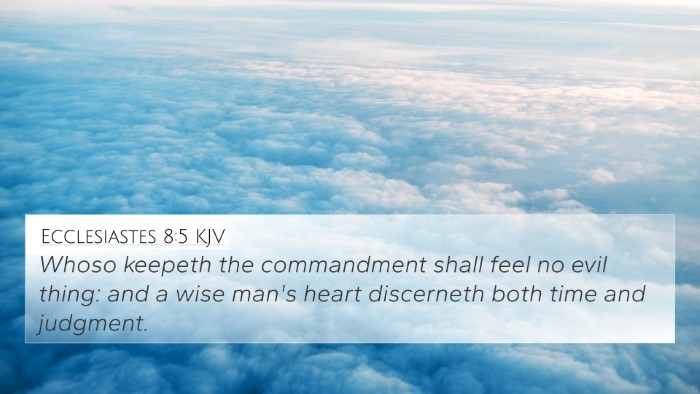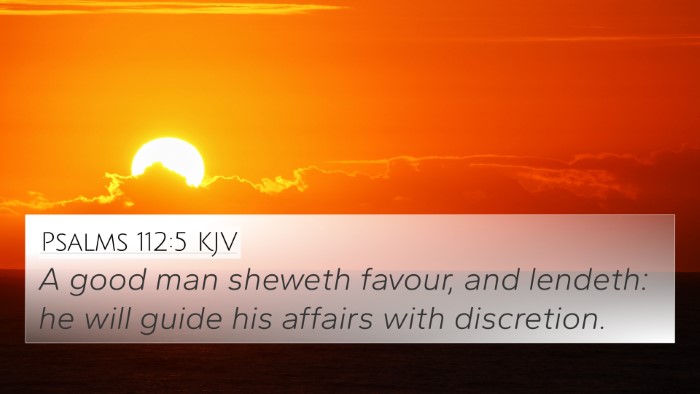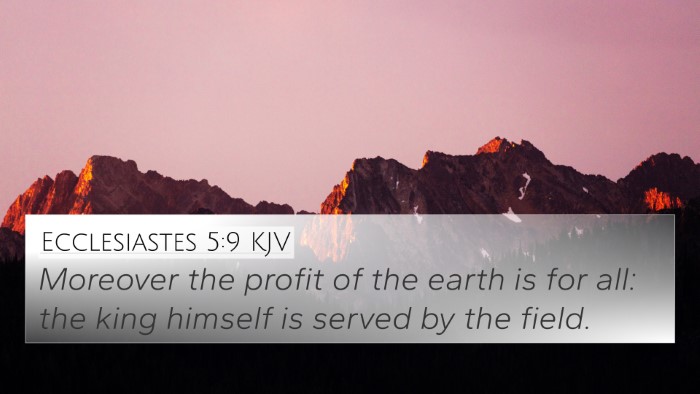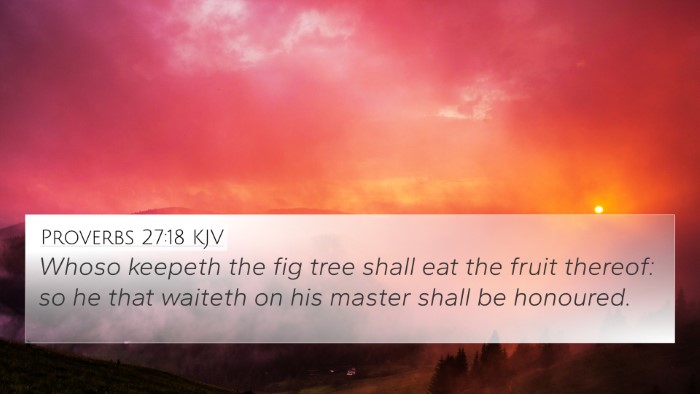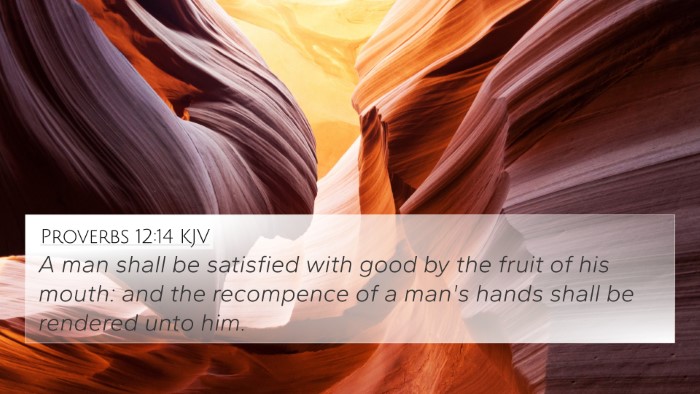Understanding Proverbs 13:23
Proverbs 13:23 states: "Much food is in the tillage of the poor: but there is that is destroyed for want of judgment." This verse encapsulates significant truths about diligence, wealth, and the nature of resources relative to wisdom and judgment. Its meaning is enriched through cross-referencing with other biblical texts, deepening our comprehension.
Summary of Insights from Public Domain Commentaries
The interpretations drawn from Matthew Henry, Albert Barnes, and Adam Clarke converge to provide a holistic view of this proverb.
Matthew Henry's Commentary
Henry emphasizes the notion that even in poverty, there's potential for richness through hard work and cultivation. He indicates that the poor, though lacking material wealth, often possess knowledge and dedication that holds the key to abundance. Moreover, he warns about the consequences of poor judgment, suggesting that even in prosperity, a lack of discernment leads to ruin.
Albert Barnes' Commentary
Barnes points out that the greater message here encompasses the idea of wise stewardship over one's resources. He delineates the contrast between diligent labor and the squandering of resources that may occur due to reckless decisions. The core lesson is about recognizing all potential wealth—both tangible and spiritual—and acting wisely to preserve it.
Adam Clarke's Commentary
Clarke amplifies the meaning with a focus on the agricultural metaphor presented in the verse. He notes that tilled land can yield much, highlighting the productive potential of the poor who engage in labor. Clarke elaborates on the idea that sound judgment enhances one's ability to reap the benefits of their labor, while neglect leads to loss. Thus, wisdom and industriousness are depicted as paramount in maximizing any resources.
Key Themes and Connections
This verse encourages a deep dive into the connections between biblical themes of diligence, judgment, and resource management. Below, we explore some cross-references that relate closely to this verse:
- Proverbs 10:4: "He becomes poor that deals with a slack hand: but the hand of the diligent makes rich." - A clear parallel that reinforces the value of hard work.
- Proverbs 21:5: "The thoughts of the diligent tend only to plenteousness; but of every one that is hasty only to want." - Highlights the importance of planning and diligence.
- Galatians 6:7-8: "For whatsoever a man sows, that shall he also reap." - A New Testament cross-reference that underscores the principle of sowing and reaping in relation to our actions and decisions.
- Matthew 25:29: "For unto every one that hath shall be given, and he shall have abundance." - This resonates with the idea of utilizing resources wisely.
- Ecclesiastes 10:18: "By much slothfulness the building decays; and through idleness of the hands the house drops through." - This verse resonates with the consequences of neglect and poor judgment in stewardship.
- 1 Timothy 6:17: "Charge them that are rich in this world, that they be not high-minded, nor trust in uncertain riches." - A reminder that material wealth should not eclipse sound judgment and diligence.
- James 1:5: "If any of you lack wisdom, let him ask of God, that gives to all men liberally." - This verse emphasizes the importance of seeking wisdom, akin to the judgment that Proverbs highlights.
Applying Cross-Referencing Tools
Understanding and engaging with Proverbs 13:23 can benefit greatly from utilizing tools for Bible cross-referencing. Here are resources and methods to enhance your study:
- Bible Concordance: An essential resource for finding cross-references in the Bible efficiently.
- Bible Cross-Reference Guide: Helps in linking Bible scriptures thematically, facilitating easier comparative studies.
- Cross-Reference Bible Study: A method that integrates various verses to discern richer meanings and applications.
- How to Use Bible Cross-References: Practical guides can aid in effectively navigating through linked verses.
- Bible Reference Resources: Utilize comprehensive materials for a thorough understanding and inter-biblical dialogue.
Conclusion
Proverbs 13:23 stands as a powerful reminder of the interplay between effort, judgment, and the blessings that may follow. By exploring this verse alongside its cross-references and utilizing appropriate study tools, one is better equipped to grasp the profound truths embedded in Scripture.
Further Study
For those interested in detailed cross-referencing and thematic explorations, consider how the principles seen in Proverbs 13:23 resonate with other biblical texts and the overarching narrative of wisdom found throughout Scripture.

